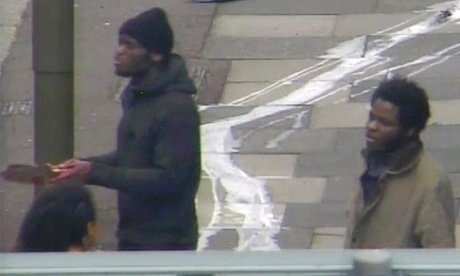MI5 and MI6 made mistakes, but only internet company could have prevented Rigby's murder, claims report
Posted by Unknown on 03:28 with No comments
CCTV footage of Michael Adebolajo and Michael Adebowale talking to
members of the public shortly after they murdered British soldier Lee
Rigby in London on May 22, 2013. Photograph: -/AFP/Getty Images
The parliamentary Intelligence and Security Committee's report into Lee Rigby's murder was conveniently sandwiched between the home secretary's keynote speech on Monday, when she described an unprecedented terror threat facing the UK, and the publication of the government's latest counter terrorism bill planned for Wednesday.
Just how convenient was made quite clear by the way the committee pointed the finger at internet companies, who are regarded by GCHQ, MI5, Theresa May and her Home Office officials, as enemies (along with civil liberty groups) in the fight against terrorism.
Had MI5 been able to read an online exchange between Michael Adebowale, one of Rigby's killers, and an "extremist overseas", there was a "significant possibility that MI5 would have been able to prevent the attack", claimed Sir Malcolm Rifkind, the committee's chair and former Conservative cabinet minister.
(The report itself prefaces the claim by saying "it is difficult to speculate on the outcome" had the internet exchange been sent to the spooks.)
The ISC does not stop there. In a press notice reflecting the report, Rifkind went so far as to say that "however unintentionally, [internet companies] are providing a safe haven for terrorists". Internet companies, he added, "appear to accept no responsibility for the services they provide".
Rifkind and his committee claim that an unnamed internet company alone can be blamed for failing to prevent Rigby's murder. The companies have been a chief target of MI5 and GCHQ, strongly backed by Theresa May and senior Home Office officials who want the companies to police the internet and websites for them.
The message was rammed home by GCHQ's new director, Robert Hannigan, in a column in the Financial Times early this month when he described web giants such as Twitter, Facebook, and WhatsApp as "command-and-control networks... for terrorists and criminals".
The companies are under extreme pressure from GCHQ , MI5, and senior ministers, to provide their data with the least possible scrutiny, control, and oversight.
This is despite evidence from a separate parliamentary committee which has strongly criticised the "snooper's charter" - and contradicted claims by the ISC on Tuesday - that most US internet companies had "extremely cooperative professional relationships" with UK security and intelligence agencies.
Edward's Snowden's disclosures have made clear GCHQ already has direct access to internet communications.
Tuesday's ISC report says the eight months it took for MI5 to start investigating Adebowale was "unacceptable" and that neither MI5 nor MI6 accorded Michael Adebolajo, Rigby's other killer, "sufficient priority" when he returned the UK from Kenya.
MI6 was involved in disrupting Adebolajo's links in Kenya with terrorist groups. Remarkably, given the disclosure of MI6's past involvement in the renditon and torture of terrors suspects abroad, the agency's approach to allegations of Adebolajo's mistreatment appeared "dismissive" and was "completely inappropriate", says the ISC report.
Yet whatever their failings, MI5 and MI6 were not in a position to prevent Rigby's murder, the ISC concludes. Only a more cooperative internet company could have prevented it.
Theresa May and David Cameron have made it clear they will introduce new laws aimed at internet companies if the Conservatives win next year's general election.
The Rigby case, like the 7/7 London underground bombings in 2005, shows how MI5 and MI6 miss, or take their eye off, potentially significant intelligence. In the Commons on Tuesday Cameron promised an extra £130m for MI5.
But the security and intelligence agencies will not be able to stop every single terror plot however great their resources.
We are unlikely ever to know whether Rigby's murder could actually have been prevented - any more than we will be able to forsee what the home secretary on Monday called attempts to "conduct marauding 'Mumbai-style' gun attacks on our streets" in the future.
Source : http://article.wn.com/view/2014/11/26/MI5_and_MI6_made_mistakes_but_only_internet_company_could_ha/




0 comments:
Post a Comment